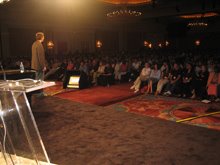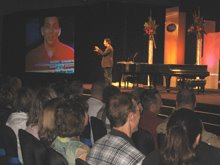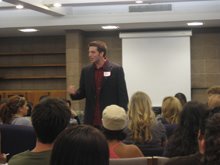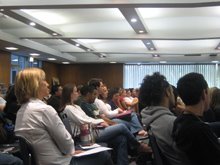 My first job out of college was at a discount furniture warehouse.
My first job out of college was at a discount furniture warehouse.
I hated it. Every day was a perfect combination of boredom, back pain and complaints from frustrated customers. The store was hot in the summer and cold in the winter. Most of my coworkers with were twice my age and my boss was a grumpy old jerk.
Fortunately, the pay sucked and there were no benefits.
Nevertheless, I needed money and I needed experience. Fast. So, I sucked it up and did the best I could.
I spent a year there. And although I didn’t realize it at the time, I actually learned a lot about business, sales, service and life. So, here are nine business lessons learned from a job that sucked:
Make a Friend in 30 Seconds
First thing I learned. My boss said it was the key to retail sales. And since he’d been in the business since roughly the 1850’s, I figured he was right. And I think it applies to retail, general sales and networking too. After all, people do business with their friends.
LET ME ASK YA THIS: How long does it take you to turn a stranger into a friend?
Don’t be a Typical Salesman
I shadowed several veteran salesmen for the first week. I studied their approaches, opening lines, closing lines and the like. Then I studied their customers: non-verbal behaviors, emotions and responses. And what I realized was: customers hate salesmen. So, I made it my goal to be the atypical salesman in every way I could. (More on this later.)
LET ME ASK YA THIS: Are you like everyone else you work with?
Think like a Chess Player
I’ve been a customer before. I know what it’s like. So, one afternoon on a slow day, I sat down and made a list of every possible feeling, emotion and assumption made by customers walking through the store. For example: “God I hope the salesman doesn’t talk to me…” and “I just want to browse, go away!” By predicting their behaviors, I was able to disarm their concerns. Instead of approaching them, I enabled them to approach me with my sense of attraction.
LET ME ASK YA THIS: What are your customers thinking about when they walk through the door?
Bring a Soda
I don’t know why, but by carrying a bottle of Diet Dr. Pepper wherever I went, customers seemed to feel more comfortable. The soda made me appear friendly, approachable, casual and not goal oriented. As if I was saying, “Yep, I’m just hanging out, drinkin’ a pop. If you need anything, I’ll be around.” Interesting, huh?
LET ME ASK YA THIS: What object could help you appear more approachable?
Be Upfront and Honest
I wasn’t on commission. So, I told customers that right away. Most of the time it made them feel comfortable, less intimidated and more willing to work with me. This strategy helped me become an atypical salesman because most of my coworkers refused to work with customers who only bought small items. They just wanted the fat commission from the bedroom set. I, on the other hand, treated all customers equally. I just didn’t care. Interestingly, the customers who bought small items from me loved working together so much, that they often returned six months later with their kids to buy the bedroom set. And who do you think they wanted them to sell it to them? Damn right.
LET ME ASK YA THIS: What truths do you tell the customers right away?
Product Knowledge
During my first few weeks, I walked around the store and made flashcards of every piece of furniture we sold. The cards included descriptions, prices and the like. Over time I was able to speed up my learning curve and memorize every item we offered to better help the customers. I’d even quiz myself on the various products when we were slow. Hell, there was nothing else to do.
LET ME ASK YA THIS: Are you the expert?
Help Customers Participate
As one of the few young salesmen in the store, I was always assigned the task of moving various couches, loveseats and tables. (Damn it!) But, although it was tough on my back, I used the moving process as a sales tool. For example, if I were sliding a couch into a corner, I’d ask customers walking by, “So, does this look good with that maple table?” or “Could you help me slide this chair around the couch please?” They were almost always happy to help. We’d often end up talking about the decorating process, sore muscles and the like. Instant friends! Also, in many instances, instant sales.
LET ME ASK YA THIS: How do you get your customers involved?
Unique Openers
I hated phrases like, “Can I help you?” or “Are you looking for anything special today?” And I knew customers hated them too. So, here’s a list of some of my favorite opening lines that enabled me to make a friend (and often a sale) in 30 seconds:
• While sitting on a couch I’d say to customers passing by, “If you guys have any questions, just wake me up!” or “Don’t tell my boss I’m here.”
• If someone was looking at the Big Lips Couch (yes, we actually sold stuff like that!) I’d say, “See, when you buy this couch, everyone who comes over to your house will get their ass kissed!”
• Lots of kids came into the store. Instead of trying to sell the parents, I sold the kids. I sold them on ME. This included offering them free donuts or taking 50% off or HOT DEAL stickers and putting them on their shirts. They loved it! The kids AND the parents.
• Because we offered donuts on the weekend, I’d always look for customers who were eating them. Then I’d offer such lines as, “Are you all hopped up on sugar yet?” and “If you spill jelly on this couch, you gotta buy it!” They loved it. Good times.
LET ME ASK YA THIS: What’s your unique opener(s)?
Unique Closers
I’m not talking about closing the sale. I’m talking about the last thing you say to a customer in your opening conversation that reminds them who you are and that you’d be happy to help. So, instead of saying, “I’m Scott if you have any questions,” or “Here’s my card if you need me,” I’d say:
• “If you need anything, I’ll be over by the donuts.”
• “Well, I’m Scott. If you have an questions, I’ll be in the back corner sleeping on the $3000 Italian Leather Sofa.” (SIDE NOTE: one out of every five customers then asked me, “Ooh! Can we see that sofa?”)
• “I’ll let you guys go have fun. If you need me, I’m the only salesman under 50.”
LET ME ASK YA THIS: What’s your unique closer(s)?
* * * *
Scott Ginsberg
Author/Speaker/That Guy with the Nametag
www.hellomynameisscott.com
 Last week I spoke to the Greater St. Louis Dental Society. My session was filled with primarily hygienists, receptionists and chair-side assistants.
Last week I spoke to the Greater St. Louis Dental Society. My session was filled with primarily hygienists, receptionists and chair-side assistants. 
 Before today’s post gets under way, I just wanted to give a quick shout to all of the haters who posted their uplifting comments (anonymously, of course) on
Before today’s post gets under way, I just wanted to give a quick shout to all of the haters who posted their uplifting comments (anonymously, of course) on  My first job out of college was at a discount furniture warehouse.
My first job out of college was at a discount furniture warehouse.  I gave a speech to the
I gave a speech to the  I was recently interviewed by a very cool new website,
I was recently interviewed by a very cool new website,  This past weekend I had the opportunity to speak at the
This past weekend I had the opportunity to speak at the  I showed the audience my favorite picture, the famous CNN interview in which I was dubbed “Name Tag Wearer.” After we all stopped laughing, I reminded them, “If you don’t actively make a name for yourself, someone will make one for you.”
I showed the audience my favorite picture, the famous CNN interview in which I was dubbed “Name Tag Wearer.” After we all stopped laughing, I reminded them, “If you don’t actively make a name for yourself, someone will make one for you.” The breakout sessions in the afternoon furthered our discussion on
The breakout sessions in the afternoon furthered our discussion on  A is for
A is for  I’d just finished a speech with group of sales managers at a Fortune 500 company. After everyone cleared out of the room, my client came up to me with a huge smile on his face.
I’d just finished a speech with group of sales managers at a Fortune 500 company. After everyone cleared out of the room, my client came up to me with a huge smile on his face.  This week I had the opportunity to speak with 150 student leaders of Res Hall Life at University of California Santa Barbara.
This week I had the opportunity to speak with 150 student leaders of Res Hall Life at University of California Santa Barbara.  They were definitely an unforgettable group! First of all, the entire front row was filled with couches. That’s what I’m talkin’ about! I was tempted to sit down in the middle of the training!
They were definitely an unforgettable group! First of all, the entire front row was filled with couches. That’s what I’m talkin’ about! I was tempted to sit down in the middle of the training!  We also had awesome feedback from the students during the famous Three Word Nametag Exercise. They all agreed that the favorites of the day included:
We also had awesome feedback from the students during the famous Three Word Nametag Exercise. They all agreed that the favorites of the day included: Now, since I’m still trying to get the hang of my new Mac, we had to bail on the PowerPoint; which wasn’t really a problem, although I do love seeing the audience’s reaction to this slide.
Now, since I’m still trying to get the hang of my new Mac, we had to bail on the PowerPoint; which wasn’t really a problem, although I do love seeing the audience’s reaction to this slide.  I really hate to admit it, but I once watched an episode of Dr. Phil.
I really hate to admit it, but I once watched an episode of Dr. Phil.